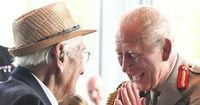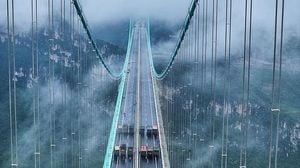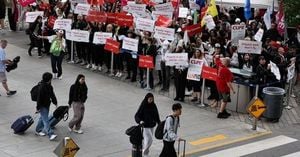Communities across Britain and beyond came together on August 15, 2025, to mark the 80th anniversary of Victory over Japan Day (VJ Day), commemorating the end of World War II in the Asia-Pacific and honoring the sacrifices of those who fought and suffered through the conflict. The day was filled with poignant ceremonies, personal tributes, and calls to remember the often-overlooked stories of Commonwealth and Indian soldiers whose roles were vital, yet sometimes underappreciated in the broader narrative of the war.
In Henley, a solemn two-minute silence was observed outside the town hall at noon, followed by the haunting notes of The Last Post played by bugler Gary Hamilton. Mayor Tom Buckley addressed the gathered crowd from the town hall steps, paying tribute to the soldiers from across the world who fought in the Pacific theater. As reported by the Henley Standard, Buckley reminded those present, “For many VE Day seemed the end of the war, and it brought a gradual return to normal life despite rationing and other major problems. However, Churchill reminded us that another ferocious war was still being waged in the Far East.” He emphasized the critical contributions of the British 14th Army, led by General Sir Bill Slim, and the backbone provided by Commonwealth troops from India, Nepal, Nigeria, and the Gold Coast (now Ghana). “Today we especially recognise the sacrifices they made and the lives lost, and a legacy of physical and mental wounds,” Buckley said. “We honour all those who paid the ultimate sacrifice to bring the Second World War to an end at a terrible, terrible cost, not only to the military and their families but to the millions of civilians, who on all sides lost so much.”
Later in the evening, a commemorative beacon was lit at Makins Recreation Ground by town councillor David Eggleton, and the Exhortation from Robert Laurence Binyon’s poem For the Fallen was read by John Green, president of the Henley and Peppard Branch of the Royal British Legion. This was followed by another period of silence and a tribute from town crier Major David Wilson. Earlier in the day, the Royal British Legion hosted a cream tea for 50 members at Henley Business School, where retired Brigadier Andrew Myrtle reflected on the significance of VJ Day for his regiment, the King’s Own Scottish Borderers, who saw action in Burma (now Myanmar). “It’s important that the war in the Far East is recognised just as much as the war in Europe because many people thought that when the war ended in Europe, that was it,” Myrtle said, as reported by the Henley Standard.
Personal stories and memories were at the heart of the day’s commemorations. Lilian Pearson Bishop recalled her father, Harold Lodge, who was part of the group that took the surrender in Japan. “My father was part of the group that took the surrender in Japan, so today is very important to me,” she told the Henley Standard. “I am delighted he survived it because a lot of people didn’t. It’s a mixture of feeling happy that he was alive and sadness the war went on for so long.”
Nearby communities also paid their respects. In Watlington, about 50 people gathered for a service at the cross in Watlington High Street, where Sarah Pullen played Il Silenzio on the cornet. Brigadier Nigel Mogg, Carol Horton, and Tessa Mogg gave brief speeches. Tessa Mogg recounted the harrowing experiences of her uncles, who were prisoners in the infamous Changi Gaol in Singapore. “No one in Britain knew what had happened to them, they were just reported missing,” she said. She shared a poignant postcard sent by her uncle from captivity: “Unwounded and well. Hoping to receive letters from you soon. Don’t worry. Keep smiling, I am. All my love Harold.”
In Wargrave, about 25 people attended a service at the war memorial outside St Mary’s Church, led by Reverend Steve Turville. Attendees joined in prayer, song, and a two-minute silence to honor the sacrifices of both soldiers and civilians. Lloyd Scrivener, standard-bearer for the Wargrave branch of the Royal British Legion, raised the flag at the ceremony. “It’s important to remember the lives that were lost in the continued war in Japan. We must still remember them,” he told the Henley Standard. Marion Pope crafted a “jungle-like” flower arrangement with dark red berries to symbolize the fallen, while Barry Paddison, chairman of the branch, emphasized the personal importance of marking VJ Day. “Being a Wargrave boy, born and bred, this area means an awful lot to me. It’s an honour,” he said.
Richard Butler, 87, a former committee member, recounted his years tracing descendants of Wargrave residents lost in the World Wars. He reflected on the involvement of over 100,000 West Africans—soldiers from Gambia, Sierra Leone, the Gold Coast (now Ghana), and Nigeria—who served with the British Army in Burma. “That’s why it’s important to me,” Butler said, highlighting the diversity of those who fought in the Far East.
While local communities remembered with solemnity and gratitude, a national spotlight shone on Captain Yavar Abbas, a 105-year-old veteran of the 11th Sikh Regiment, who spoke at the National Memorial Arboretum during a VJ Day 80 remembrance service. According to The Mirror, Abbas moved the nation when he saluted King Charles and Queen Camilla during a live broadcast, thanking them for honoring the “forgotten Army” of the British 14th Army. His impromptu tribute left both royals visibly moved. “Apologies for briefly going off the script to salute my brave King,” Abbas said. “Who is here with his beloved Queen in spite of the fact that he is undergoing treatment for cancer.”
After the ceremony, Abbas and King Charles shared an intimate conversation, discussing their respective battles with cancer. Abbas revealed that he underwent treatment for cancer 15 years ago in India using High-Intensity Focused Ultrasound (HIFU), a non-invasive treatment. “I told the King about my treatment and he was interested in that, but we couldn’t take the conversation further because it would have been too intimate,” Abbas said. He expressed hope that the King might benefit from the same treatment, and shared his desire to spread awareness about HIFU in the UK.
Abbas’s life story is itself a testament to resilience. Born prematurely in a remote part of India in 1920, he survived against the odds. He joined the 11th Sikh Regiment in 1939, later training as a combat cameraman with the British 14th Army. He witnessed the horrors of the Burma campaign and the devastation in Hiroshima months after the atomic bombings. “When I saw it there were no flowers, it was a scene of utter desolation. I still think about it and it still haunts me,” Abbas recalled of his time in Hiroshima.
Now, Abbas advocates for a war memorial at the National Memorial Arboretum to honor Indian soldiers, describing the Indian Army as the “forgotten army” due to the effects of partition. His message is one of remembrance and a plea for peace. “The biggest war crime is war itself. Why do we have to go to war, what do we gain? Even a warrior like Churchill said ‘jaw, jaw is better than war, war,’” Abbas told The Mirror.
The 80th anniversary of VJ Day served as a powerful reminder of the enduring legacy of World War II in the Asia-Pacific, the sacrifices made by countless individuals from across the Commonwealth and India, and the importance of ensuring that their stories are remembered—not just on anniversaries, but always.




